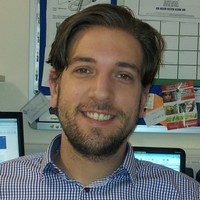Adam Darwich new assistant professor in health systems engineering
NEW DIGITALISATION RESEARCHERS
In 2019, Adam Darwich was appointed assistant professor in health systems engineering at the Department of biomedical engineering and health systems/CBH. His research focus is in modelling and simulation methods to inform decision-making in healthcare and pharmaceutical research.
What is your research area?

"My main research interest is in model-informed decision support for healthcare and drug development. This involves the use of statistical, mathematical and systems modelling approaches to understand natural (e.g., human, disease) and man-made systems (e.g., healthcare). To give a more concrete example, my background is in physiologically-based pharmacokinetic modelling. The approach makes use of in vitro drug data, physiological system information, and in vivo study data, to predict drug concentration-time profiles.
Pharmacokinetic models are used to inform drug development, such as candidate drug selection, study design, effects in special populations, and dosage recommendations. In fact, there are over 100 examples of pharmacokinetic modelling being used to inform dosage recommendations in the Summary of Product Characterstics. That includes the information you might find in a medicine package leaflet.
I also have a broader interest in models to inform decision-making in healthcare. This includes models of patient flows, processes, decision points and pharmacology to optimise treatment, dose individualisation, risk stratification and operations in the hospital and associated services. Here we make use of statistical methods, pharmacokinetic models, machine learning, discrete-event simulation but also more qualitative systems approaches combined with expert input to better understand the data," Adam Darwich says.
What are the large research challenges in your research area and why?
"Pharmaceutical regulators have highlighted the value of so-called real-world data. That is, health data originating outside of randomised controlled studies, such as patient-generated data and electronic health records. The ambition is to leverage real-world data to generate evidence on the benefits and risks of treatments and medicines. Experience of the approach is still quite limited in academic research, and there are several challenges that need addressing. For instance, how we should handle data access, governance, patient integrity.
We also need to reconsider how we analyse data to account for these highly variable datasets that may be large in volume but sparse with regards to information. Otherwise, we risk introducing bias into our models. Solving these challenges require highly inter-disciplinary efforts, some of which we aim to address through the research we carry out at the Center for Data-driven Health (CDDH), founded and led by Professor Sebastiaan Meijer.
A related challenge is how we can build evidence for models as decision-support to enable system-wide implementation. This is a problem also relevant to medical technology innovation. We have worked with project partners, health technology assessment organisations, patient representatives, clinical experts and medical technology innovators to create a tool to support evidence generation for medical devices (available on MedTech Arena). However, we also need to engage with decision-makers to create change."
If you are looking for research collaborators, what competence is important?
"The research we carry out in the group stretches across multiple areas of application and disciplines. One of the most important factors in my experience is to take a broader perspective grounded in domain-specific expertise. If you find any part of these topics of interest, I encourage you to get in touch. I am always happy to discuss these issues with anyone willing to engage."
Tell us more about one of your research results and why you picked it?
"We have a collaboration with the group of Drs. Luigi Di Petris and Rolf Lewensohn at the Department of Oncology-Pathology, Karolinska Institutet. Within the scope of this collaboration our doctoral student, Luca Marzano, has investigated the detection of prognostic subgroups in small cell lung cancer based on a real-world data patient cohort using clustering methods in machine learning. The method was able to characterise several subgroups of interest that were not detectable using a more conventional approach. More broadly, the study has allowed us to develop a framework, and recommendations on how healthcare data can be used for generating evidence of disease, treatment individualisation and improved decision-making in healthcare."
Lastly, what do you like with Sweden, Stockholm, and KTH?
"From a research perspective, Sweden has a historically unique system of healthcare data collection through the quality registries and the linking of these. Region Stockholm is interesting in this aspect with a large healthcare sector, industrial and academic presence. In other words, there are ample opportunities for networking with interesting people and carrying out research with links to real-world problems. As a workplace, KTH provides many opportunities for inter-disciplinary interactions and collaborations."
Related
- National development project for implementation of MedTech innovations and services
- Adam Darwich KTH profile
- Marzano et al. A novel analytical framework for risk stratification of real-world data using machine learning: a small cell lung cancer study. Clin Transl Sci. 2022;00:1-11
- Precision Cancer Medicine in Lung Cancer, Department of Oncology-Pathology, Karolinska Institutet
- Center for Data-driven Health
- Future Care - systems modelling for homecare
- MedTech Arena, evidence generation tool for medical devices
- More new researchers within digitalisation
